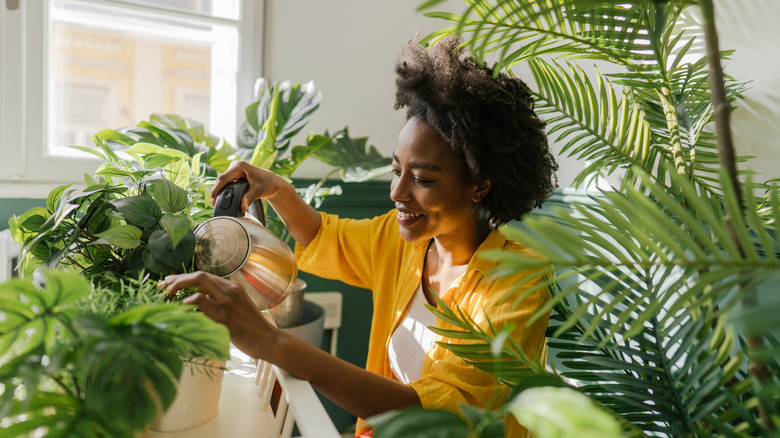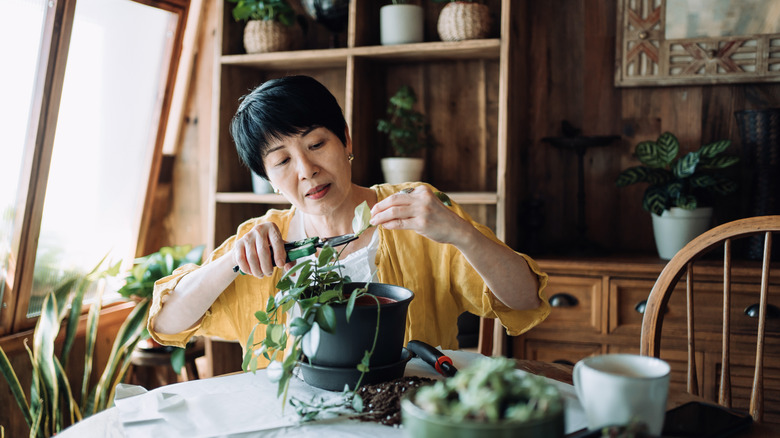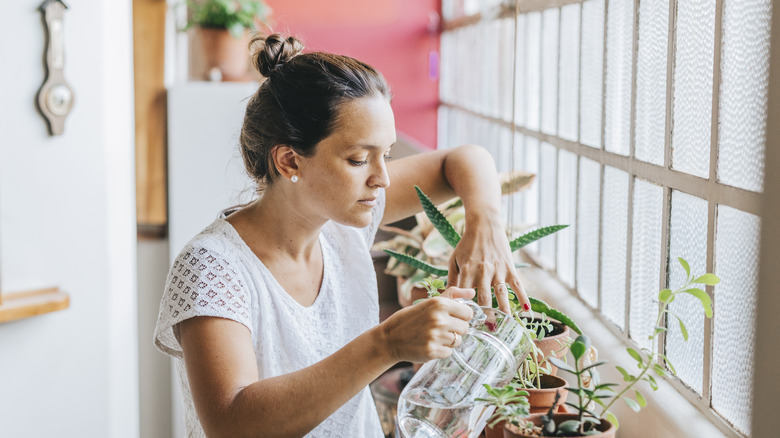How Often You Should Fertilize Your Indoor Houseplants, According To Our Plant Care Expert
Growing houseplants can be a fun hobby and a great way to add life to your home. However, many people often underestimate the care that houseplants need to thrive. Houseplants often need to be fertilized on top of receiving regular watering and sunlight. Fertilizer adds more nutrients that might be missing in the soil and helps encourage large and healthy leaf growth. So, how often should you fertilize your plants for optimal growth? Marina Olshansky, the founder of Vesca Botanicals, explains in an exclusive interview with House Digest that "different plants have different fertilizing needs, but the majority are happy being fertilized once a month only in spring and summer."
However, you can also over-fertilize a houseplant, which can lead to yellow or brown leaves or leaf loss as well as slow or little growth. Only fertilizing once a month gives the plants some time to absorb the nutrients, and watering in between fertilizing can help flush out the excess nutrients. While it won't necessarily hurt the plant, fertilizing in the winter isn't necessary because most plants enter a stage of dormancy where they aren't actively growing. If a plant has entered dormancy during the winter, fertilizing can end up doing more harm than good to the plant.
Fertilizing your houseplants
Fertilizer can be the secret ingredient to big, beautiful plant leaves. However, knowing where to start when it comes to choosing the right fertilizer can be overwhelming. Not every plant needs fertilizer to thrive. Marina Olshanky explains in an interview with House Digest, "If their natural habitat has very fertile soil, they will thrive with more frequent fertilizing — as opposed to something like a cactus, which can go years without fertilizer." Plants that are native to more tropical and lush environments may thrive with more fertilizer when potted in a planter in your home.
You should also consider the kind of nutrients in the fertilizer when choosing the right one for your houseplants. Fertilizers have an N-P-K ratio, which refers to the amount of nitrogen, phosphorus, and potassium in that fertilizer. The nutrients help houseplants in different ways. For example, phosphorus helps flowering, so fertilizers that have a higher "P" value will help houseplants grow larger blooms. However, for leafy plants and growing larger, healthier leaves, use a fertilizer with more nitrogen or a higher number in the "N" value of the ratio.
Of course, you can use a combination of fertilizers with different values of the N-P-K ratio to target different aspects of your plant's growth. However, most houseplants will thrive with fertilizer with higher nitrogen values only. African violets, begonias, and other flowering plants can benefit from a combination of higher phosphorus and higher nitrogen.
How to fertilize properly
Fertilizer comes in many forms, each with its own benefits. In general, you'll find liquid, sticks, granules, tablets, and slow-release fertilizer. Speaking to House Digest, Marina Olshanky said, "I recommend a liquid fertilizer you can add to water." Liquid fertilizers are added to water and delivered to a plant when you water them. This allows the nutrients to be evenly distributed throughout the soil. You have less control with fertilizer sticks and granules, as the fertilizer may not spread throughout the soil, and you can't control when the nutrients are released. "If you do use a store-bought fertilizer — use a little bit less than it tells you to ease your plants into it," Olshanky suggests. "Too much fertilizer can burn the roots of your plants, so start them slowly."
Another option for delivering nutrients to houseplants is with compost. "or [add] a layer of compost over the soil early in the spring for a more gentle fertilizer," Olshanky says. To use kitchen scraps, place vegetables, fruits, coffee grounds, and bread into a compost bin. Depending on the bin, the process can take between two weeks to six months. While it's not an instant choice, it's a good option if you cook at home and want to reduce food waste. "If you have a freshwater fish tank, you can water your plants with the water from that!" Dirty water from fish tanks has nitrogen, phosphorus, and potassium, which can act as natural fertilizer for houseplants.


